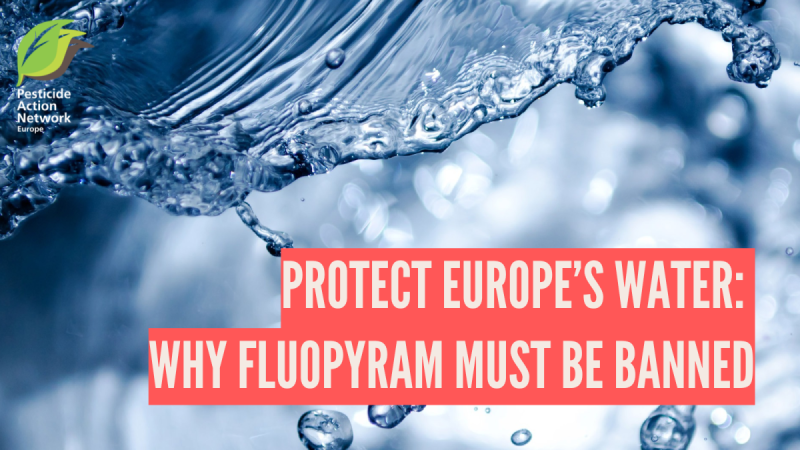Europe faces an urgent challenge: protecting its water resources from harmful chemical contamination. At the center of this issue are PFAS pesticides that contribute to significant levels of trifluoroacetic acid (TFA) in groundwater. One of them is the widely used fluopyram. Despite clear evidence of its harm, fluopyram’s EU approval has been extended until 2026, putting public health and the environment at risk.
What is Fluopyram, and why is it a problem?
Fluopyram is a pesticide used across Europe, primarily as a fungicide but also to combat nematodes (roundworms). Like other PFAS pesticides, it is part of a group often called “forever chemicals” due to their high persistence in the environment. Fluopyram breaks down into TFA, an ultra-short PFAS known for its high mobility and persistence.
TFA contamination is already widespread, found in groundwater, surface water, drinking water, and even mineral water. TFA has also been detected in food products, including those intended for infants. These findings are alarming, especially as evidence grows about TFA’s toxicity. Currently, there is a proposal to classify TFA as toxic for reproduction category 1B and as ‘persistent, mobile, and toxic’ (PMT).
Under EU Pesticide Regulation 1107/2009, substances that produce “relevant” (toxicologically) metabolites like TFA are prohibited if they are found to contaminate groundwater above the legal limit of 0.1 µg/L. Fluopyram clearly meets this condition. Bayer’s renewal dossier, submitted in 2021, shows that TFA concentrations in groundwater exceed this threshold under all scenarios, even with minimal use of the pesticide.
Yet, the Commission extended fluopyram’s approval in January 2024 for another 2.5 years.
Learning from past mistakes
The mishandling of fluopyram echoes the case of flufenacet, another PFAS pesticide active substance. Despite scientific evidence of its harmful effects, flufenacet’s approval was prolonged for 11 years before a proposal for its non-renewal was presented in December 2024. This delay allowed extensive water contamination to continue for several years.
A Call for Immediate Action
We cannot afford further delays in addressing fluopyram. PAN Europe and a coalition of NGOs have sent a letter to call upon the European Commission to:
- Withdraw fluopyram’s approval immediately under Article 69 of Regulation 1107/2009, citing its serious risk to human health and the environment.
- Propose its ban at the March 2025 meeting of the Standing Committee on Plants, Animals, Food and Feed (SCoPAFF).
Protecting Europe’s water resources requires bold and decisive action. Scientists have identified TFA as a “planetary boundary threat,” demanding urgent efforts to reduce emissions. Banning fluopyram is a necessary step toward safeguarding our water resources, public health, and ecosystems.
Read more
- Letter asking the EU Commission to propose a ban on fluopyram, PAN Europe, Générations Futures, Global 2000 and 26 other NGO’s, January 31, 2025
- Ban PFAS pesticides and TFA
- Europe’s Toxic Harvest: unmasking PFAS pesticides authorised in Europe, PAN Europe and Générations Futures, November 2023
